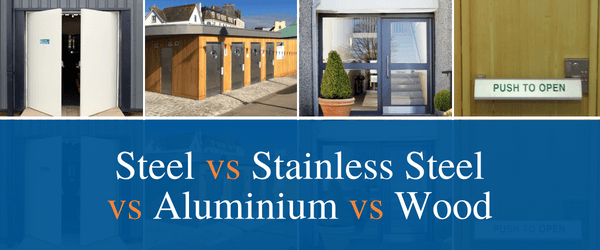Bradbury Group understands that when it comes to securing your property, it is important to ensure that the right security product is specified and tailored to suit your requirements. Whilst there may be many factors to consider in relation to your premises, including location, building type and usability, it is important to first gain a basic understanding of the materials on offer.

Whether you are seeking to protect an industrial, commercial or domestic property, this guide aims to help you understand the characteristics of each material to determine what your door should be constructed from.
Steel has a high tensile strength and typically low cost. It is a major component used in buildings, infrastructure, tools, ships, automobiles, machines, appliances, and weapons. Steel is the ideal material for security products as it won’t shrink, crack or warp over time. Steel doors are also available in a wide range of configurations and with third-party accreditations to suit a variety of applications. Optional LPCB certification offers increased durability, and an assured level of security.
To combat issues such as corrosion, which may appear in some materials over time, steel doors can be primed and painted to ensure an extensive lifespan, with Marine grade options available to substantially increase corrosion resistance.
Bradbury Group offers a wide selection of steel security doors that are competitively priced, and offer sturdy, high-quality security options for any building. Available in a variety of finishes, ironmongery, glazing and louvre options, our steel doors are custom-made to suit your individual requirements. We also have an extensive selection of certified steel doors, offering solutions for security, flood, fire, and acoustic requirements.
With high resistance to wear and abrasion, stainless steel is a popular choice. As it is heavier and more durable, it is less likely to warp or deform under force, or heat. Able to withstand a high level of attack, it can protect against vandalism and anti-social behaviour, and is ideal for extreme environments, including coastal regions.
As stainless steel is a durable material, it can sometimes be accompanied by a hefty price tag due to the manufacturing process. From the machinery to the welding, it can be a difficult metal to handle.
Bradbury Groups best-selling M2M+ doors are available constructed from stainless steel, as opposed to standard steel. These Specialist doors offer enhanced strength and corrosion resistance at an affordable price. For public buildings and social housing, we also offer Classic2S doors which ensure high durability, longevity and resistance to corrosion.
Aluminium is a popular choice for many property owners including domestic and commercial, due its low maintenance and corrosion resistant properties that help to extend the materials lifespan. As it is a malleable material, aluminium is the easiest to work with, helping to decrease the overall cost of manufacture.
Although aluminium is the lightest of the four materials, it is typically not as strong as steel and when offered with no reinforcing properties, is best suited for low-risk environments that don’t require a high level of security.
Our ClassicAL communal doors are constructed from aluminium, and reinforced with stainless steel to increase strength and durability of the doorsets, whilst maintaining a low weight. Helping to provide peace of mind, the ClassicAL is also LPCB certified to LPS 2081 Security Category B.
Wood is the traditional material used within door construction due to its unique characteristics and ornate details. Wooden doors are typically installed in domestic properties, and as internal doors within hotels and office buildings. As the material is easy to work with, it means that it can be custom made to suit functional design options, as well as being tailored to suit the individual’s style.
However, although wooden doors are available with third-party certification, they are suited for low-risk locations as, despite the doors being made of a solid construction, there is a risk of warping and weakening around the hinges over time.
Wooden doors have been adapted to suit the market of modern homeowners who are growing increasingly concerned with improving the aesthetics of their property. Due to this, wood is sometimes the more expensive option of the materials on offer. Bradbury Group has developed a perfect balance between form and function in a high quality, wood effect powder coated finish, bringing the warmth of a real wood effect, without the high cost, maintenance, and weathering issues.
If you require further assistance in selecting the most appropriate security product for your requirements, please contact our expert sales team via 01724 271999 or sales@bradbury-group.com.